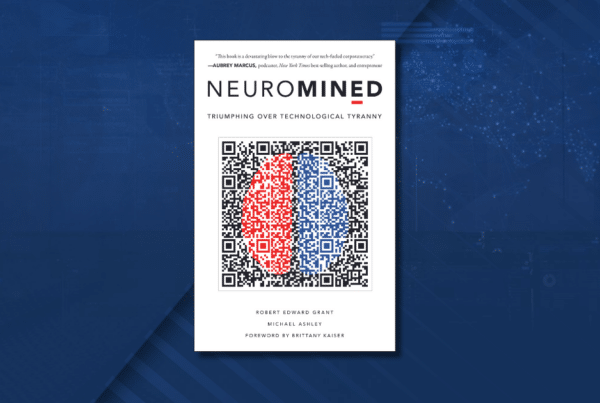
An article by Michael Ashley and Robert Edward Grant (Crown Sterling Founder & CEO) in promotion of their upcoming book Neuromined: Triumphing over Technological Tyranny (Fast Company Press 2023)
The year is 2030 and you’re a doctor specializing in holistic care. You provide telehealth services to people all around the world using Zoom for remote conferencing and PayPal to accept payments, no matter the country.
Your specialty is providing 100% natural cures to any number of maladies such as vertigo, nausea, and migraines. That’s because your arborist grandfather taught you the amazing healing properties of trees and plants. Happily, your practice has been going strong for years. So many patients love the health results you’ve produced for them, it’s led to endless referrals. In fact, you’re so in demand, you’re often booked out months in advance.
Then one day, something strange happens.
You receive notice from PayPal informing you that your payment processor will be debiting you for misinformation. “A levy of $2,500 will be deducted from your account for each violation,” it reads.
What?
Heart racing, you log in to see your digital wallet has been drained by $50,000. The money is just gone.
You appeal to your bank to restore the funds, but they apologetically decline. “You must take that up with your provider,” says the branch manager. “This isn’t our department.”
PayPal isn’t much help, either.
Upon lodging a complaint, you receive this explanation—if you can call it that: “3rd party sources have expressed concern over your company’s medical practices. We take such matters seriously as they can lead to injury, disease, even death. Your account is currently under review.”
Several paragraphs later, you learn you can expect a decision within 120 days. Until then, your account remains suspended, your money gone.
*****
As Amanda Pérez Pintado reported for USA Today last month, “Searches for how to ‘delete PayPal’ skyrocketed by nearly 1,400% worldwide after the payment service released a policy update that said users would have to pay up to $2,500 in damages for spreading misinformation—which the company has since called an error.”
More on the “error” later. For now, let’s talk about misinformation.
Did you know Dictionary.com crowned the term ‘misinformation’ as Word of the Year in 2018? CNN weighed in on the dubious distinction this way: “While the word has been around since the late 1500s, it made a huge comeback this year as the amount of false information on the internet expanded.”
CNN also informed readers that Dictionary.com planned to fight such misinformation. “‘Our #WordOfTheYear2018 isn’t just any word. It’s a call to action. We’ll be sharing the tools to fight #misinformation all day today,’ the site tweeted earlier today.”
How nice of Dictionary.com to protect us. Like PayPal, they’re on the front lines of the information war, determining what’s fake news and what’s real. Except neither Dictionary.com nor PayPal are in the news business.
But the government is?
Turns out that beyond (unsuccessfully) trying to install a so-called Disinformation Governance Board in 2022, the government has been surreptitiously directing social media platforms to censor, limit, and control the information the public receives. (Sidenote: Dictionary.com defines misinformation as “false information that is spread, regardless of intent to mislead.” It defines disinformation as “false information, as about a country’s military strength or plans, disseminated by a government or intelligence agency in a hostile act of tactical political subversion.” For the general purposes of our article, either term speaks to the same perceived problem.)
Back to the government’s surreptitious foray into content moderation. Intrepid journalists Ken Klippenstein and Lee Fang just produced a bombshell report for the Intercept on what the government has been secretly up to:
Behind closed doors, and through pressure on private platforms, the U.S. government has used its power to try to shape online discourse. According to meeting minutes and other records appended to a lawsuit filed by Missouri Attorney General Eric Schmitt, a Republican who is also running for Senate, discussions have ranged from the scale and scope of government intervention in online discourse to the mechanics of streamlining takedown requests for false or intentionally misleading information.
Among other stunning revelations, Klippenstein and Fang uncovered there is a “formalized process for government officials to directly flag content on Facebook or Instagram and request that it be throttled or suppressed through a special Facebook portal that requires a government or law enforcement email to use.”
To put this development in context, let’s recall this is the same government that knowingly disseminated its own mis/disinformation on weapons of mass destruction, leading to needless war, that lied us into Vietnam, and covered up how its own agents infiltrated news and entertainment to influence public perception under Operation Mockingbird.
In an epic rant condemning US’ Homeland Security secretary Alejandro Mayorkas and his short-lived Disinformation Governance Board, Senator Paul Rand expressed the views of many on the laughable notion the government can be trusted as any arbiter of truth:
Do you know who the greatest propagator of disinformation in the history of the world is? The U.S. government. Are you familiar with McNamara? The Pentagon Papers? Are you familiar with George W. Bush and the weapons of mass destruction? Are you familiar with Iran/Contra? I mean, think of all the debates and disputes we have had over the last 50 years in our country. We worked them out by debating them. We don’t work them out with the government being the arbiter. I don’t want governing guardrails. I want you to have nothing to do with speech. . . . You think the American people are so stupid, they need you to tell them what the truth is.
Now onto the laughable notion that PayPal—or any other company—can or should triage what’s true or not. Soon after the public revolted against Paypal in October, terminating their accounts in disgust with the payment app, the company did damage control, releasing this statement: “An AUP notice recently went out in error that included incorrect information. PayPal is not fining people for misinformation and this language was never intended to be inserted in our policy. We’re sorry for the confusion this has caused.”
PayPal has since walked back their punitive policy of fining users for “promoting misinformation.” We’ll see how that turns out.
For now, it’s all too clear that centralized technological control is growing daily, inspiring us write our upcoming book Neuromined: Triumphing over Technological Tyranny (Fast Company Press 2023).
In the future and without our own bottom-up awareness campaign, the true purveyors of mis and dis-information won’t just restrict our access to the truth. They’ll punish us for not going along with their deceits.
Let’s not let them.
About Crown Sterling Limited LLC
Leader in Data Sovereignty and provider of quantum-secure encryption, Crown Sterling empowers individuals and communities in an era of unregulated data consolidation, monopolization, and monetization by Big Tech. By leveraging next-generation encryption, blockchain technology, and decentralized digital transformation represented by Web3, we are committed to granting you complete control over your personal data and supporting the protection of free speech, assembly and choice.
The launch of Orion™ Messenger presents a quantum-secure end-to-end encrypted, uncensorable, and decentralized communications platform as a solution where sovereign individuals and communities can thrive. Unlike commonly used applications that rely on vulnerable encryption protocols, data mining practices, and other limitations, Orion is the only platform allowing for large encrypted group chat and social media communications in an unmonitored and uncensorable environment. Join the Orion Messenger waitlist.













